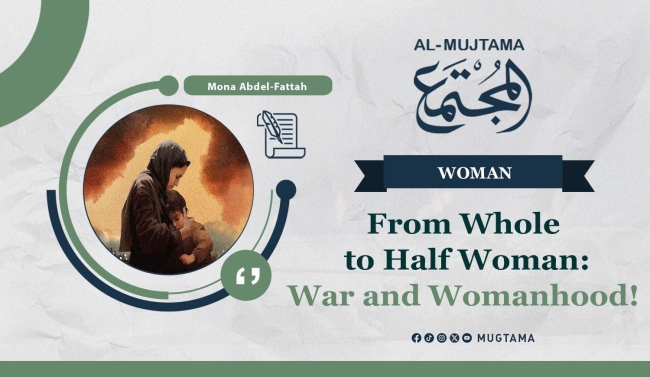Yes, she is half a woman, perhaps the remnants of a woman, facing the brutal Zionist aggression in steadfast Gaza amidst international complicity. She is the woman who lived through the tragedy of the infamous Sednaya Prison in Syria for years. She is the mother now displaced in Yemen, a refugee in Sudan, whose family has been torn apart, losing her husband, a son, or a brother.
Women are often the ones who pay the heaviest price in wars, and they usually pay this price multiple times. They pay it as women subjected to rape and sexual violence, as wives widowed by the killing of their husbands, as mothers whose children become martyrs, and as activists facing oppression and imprisonment, enduring a massive and bloody tragedy with lasting effects for years and decades.
From injustice and oppression to poverty, ignorance, unemployment, and spinsterhood, women in many countries endure harsh suffering due to wars in which they have no stake, yet they remain targets for the machinery of war, the regime’s thugs, and the prisons of dictators. Meanwhile, the world boasts about “women's rights” in the 21st century.
Eyes are closed, tongues are silenced, and consciences die when the target and victim are Arab or Muslim women. Then, they become deaf, mute, and blind, neither condemning the suffering of these women nor imposing sanctions on those responsible for their ordeal. The suffering of these women, driven to the edge by wars and ongoing conflicts funded by regional and international forces, unfolds under the watchful eye of the international community and global organizations.
When Umm Ahmed stepped on a landmine left behind by years of war in Yemen, it tore apart her frail body. She wasn’t a fighter in a battle, nor was she affiliated with any political party; she was merely a victim caught between lives lost and limbs severed, as reported by the International Committee of the Red Cross.
The 2023 report states that women are sometimes used as tools of war, subjected to physical violence, their social roles shrink and their options diminish as conflicts drag on. This exacerbates their suffering and makes them vulnerable to economic, social, and psychological setbacks.
According to alarming statistics, nearly 90 million girls — one in five girls worldwide — live in conflict zones, facing devastating consequences for their physical and mental health.
Gaza in Agony
The women of Gaza are a living example of this painful reality in a world that annually celebrates women while they are reduced to “half women” in a place that has become a mark of shame on humanity’s conscience. Women and children make up about 70% of the casualties of the “Israeli” war on the Strip between November 2023 and April 2024, according to data from the UN High Commissioner for Human Rights.
More than a million women in Gaza lack access to food, clean drinking water, or sanitary facilities, including bathrooms and sanitary pads. Four out of five mothers skip meals to feed their children. Some 155,000 pregnant and breastfeeding women face medical and psychological hardships, and 328,000 girls have been deprived of education. Over a million women have been displaced, according to the report titled “Gaza: War on Women’s Health,” published by UN Women last September.
Sima Bahous, the Executive Director of UN Women, stated that two mothers are killed in Gaza every hour. The spokesperson for the UN Secretary-General, Stéphane Dujarric, reported that around 3,000 women have lost their husbands or become the sole breadwinners for their families in the Zionist war, which claimed over 155,000 martyrs and wounded.
The tragedy of Gaza’s women has long exposed the hypocrisy of the West and the international community regarding women’s rights, with no protection umbrella to shield them from death by shelling, starvation, cold, or captivity. They are defenseless, unarmed, and not military targets to provoke Netanyahu’s jets, Ben-Gvir’s cannons, or Smotrich’s bombs. The world has never moved to establish a no-fly zone to protect civilian women and children or impose severe sanctions on the aggressors, as it did in response to Russia's war on Ukraine.
Of course, the blood of Ukrainian women differs from that of Palestinian women. The international community’s response to women differs based on their nationality, religion, and language. Palestinian women pay the price as females, Arabs, and Muslims, while the world annually celebrates International Women’s Day as the processions of female martyrs continue in Gaza.
True recognition of women should be an opportunity to show solidarity with women in conflict and war zones, especially Palestinian women. It should involve legislating laws to protect them, safeguard their dignity and honor, allocate funds to meet their needs, and rehabilitate them psychologically, medically, educationally, socially, and economically. They should be honored in international forums to ensure they are not reduced to “half women.”
Urgently, reconstruction efforts should extend beyond rebuilding infrastructure to rebuilding these women, providing recovery environments, healing their wounds, compensating them for lost education, facilitating marriage for widows, supporting mothers who have lost children, rescuing those who have lost homes, and ensuring their security while holding aggressors accountable to prevent a recurrence of such tragedies anywhere in the world.
-------------------------------------------------------------


